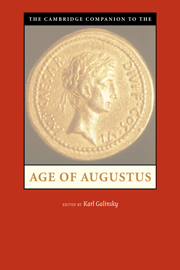Book contents
- Frontmatter
- Introduction
- Part I Political History
- Part II Intellectual and Social Developments
- 3 Mutatas Formas: The Augustan Transformation of Roman Knowledge
- 4 Romans in the Roman World
- 5 Provincial Perspectives
- 6 Women in the Time of Augustus
- Part III The Emperor's Impact
- Part IV Art and the City
- Part V Augustan Literature
- Part VI Epilogue as Prologue
- Select Bibliography and Works Cited
- Index
3 - Mutatas Formas: The Augustan Transformation of Roman Knowledge
from Part II - Intellectual and Social Developments
Published online by Cambridge University Press: 28 March 2007
- Frontmatter
- Introduction
- Part I Political History
- Part II Intellectual and Social Developments
- 3 Mutatas Formas: The Augustan Transformation of Roman Knowledge
- 4 Romans in the Roman World
- 5 Provincial Perspectives
- 6 Women in the Time of Augustus
- Part III The Emperor's Impact
- Part IV Art and the City
- Part V Augustan Literature
- Part VI Epilogue as Prologue
- Select Bibliography and Works Cited
- Index
Summary
In nova fert animus mutatas dicere formas/ corpora
(“My mind impels me to tell of forms changed to new bodies”; Ovid, Met. 1.1–2)
Ovid's extraordinary tour-de-force in representing all of mythology, indeed the whole history of the world from creation to the deification of Caesar, as a seamlessly interconnected series of transformations, offers a vision rooted in contemporary Augustan experience. The transformational skill with which Augustus constructed his new order out of the elements of the old order is conceptually parallel to the processes, which Ovid loves to describe, by which Daphne's metamorphosis from human to tree happens gradually, almost organically, using individual elements of the old body to fashion a new body.
It is hard for us to find the appropriate language in which to characterize the impact of Augustus. If we speak of a 'Roman Revolution', we not only inescapably evoke the revolutions of the modern world, and their social antagonisms rooted in the specific circumstances of capitalism, but we also represent the outcome in a way that does violence to the ideology of the players themselves. 'Metamorphosis', unlike 'revolution', allows some space for the Augustan claim to be restoring and adding to Roman tradition. But terminology is not the issue. That the reign of Augustus represents a major rupture in political systems is beyond dispute. The much larger issue is how political revolution (or transformation) ripples outward in its effect on society and culture.
- Type
- Chapter
- Information
- The Cambridge Companion to the Age of Augustus , pp. 55 - 84Publisher: Cambridge University PressPrint publication year: 2005
- 7
- Cited by



